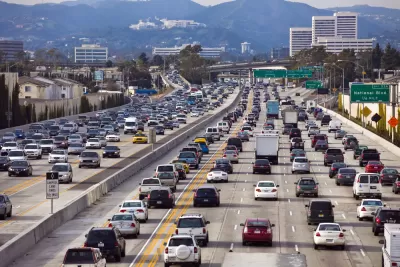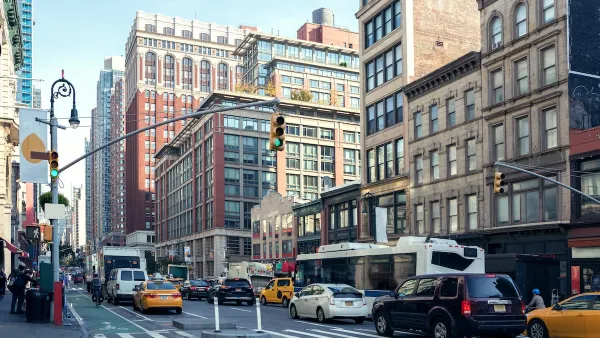A New York Times article marks the historic significance of congestion pricing—gone are the days of treating roads like they're free while ignoring their costs.

Emily Badger writes on the subject of congestion pricing, the major transportation reform under consideration in Los Angeles and well on the way to implementation in New York City. According to Badger, the idea of charging drivers to enter parts of Manhattan, also known as Cordon Pricing, could enact a generational shift in the conventional thinking about transportation:
Congestion pricing has the potential to significantly change how traffic flows through Manhattan streets, how commuters get around the city, how companies like Uber and Lyft operate.
But most radically, if the policy spreads it could challenge a deeply embedded cultural idea, requiring people to pay for something Americans have long demanded — and largely believe they’ve gotten— free of charge.
Congestion pricing would end the illusion of driving as an entitlement, according to Badger. Instead, congestion pricing treats roads as a valuable and scarce resource.
Badger cites experts in transportation planning, such as Michael Manville, professor of urban planning at the University of California, Los Angeles, Kari Watkins, a professor at Georgia Tech’s School of Civil and Environmental Engineering, Jeffrey Tumlin, a transportation consultant at Nelson\Nygaard, Peter Norton, a historian at the University of Virginia, and more.
The purview of the article draws on a history of treating roads as an entitlement back, before explaining the conditions that have created the political will in 2019 to reform many of the massive entitlements afford cars and drivers since the 1920s and '30s. The final word is left to Manville, who says, "Fortunately, congestion pricing comes with its own built-in solution, which is that it raises a ton of money."
FULL STORY: The Streets Were Never Free. Congestion Pricing Finally Makes That Plain.

Planetizen Federal Action Tracker
A weekly monitor of how Trump’s orders and actions are impacting planners and planning in America.

Chicago’s Ghost Rails
Just beneath the surface of the modern city lie the remnants of its expansive early 20th-century streetcar system.

San Antonio and Austin are Fusing Into one Massive Megaregion
The region spanning the two central Texas cities is growing fast, posing challenges for local infrastructure and water supplies.

Since Zion's Shuttles Went Electric “The Smog is Gone”
Visitors to Zion National Park can enjoy the canyon via the nation’s first fully electric park shuttle system.

Trump Distributing DOT Safety Funds at 1/10 Rate of Biden
Funds for Safe Streets and other transportation safety and equity programs are being held up by administrative reviews and conflicts with the Trump administration’s priorities.

German Cities Subsidize Taxis for Women Amid Wave of Violence
Free or low-cost taxi rides can help women navigate cities more safely, but critics say the programs don't address the root causes of violence against women.
Urban Design for Planners 1: Software Tools
This six-course series explores essential urban design concepts using open source software and equips planners with the tools they need to participate fully in the urban design process.
Planning for Universal Design
Learn the tools for implementing Universal Design in planning regulations.
planning NEXT
Appalachian Highlands Housing Partners
Mpact (founded as Rail~Volution)
City of Camden Redevelopment Agency
City of Astoria
City of Portland
City of Laramie





























